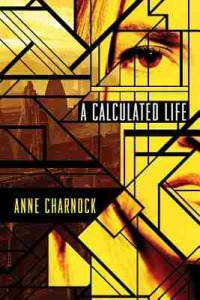
Published by 47North on September 24, 2013
What does it mean to live a "normal" life? Anne Charnock sheds light on human existence by looking at "normal" humans from the perspective of a genetically engineered human -- one who is designed to function without emotions or a sense of wonder.
Jayna is an analyst living in a near future England. She looks for correlations: crime and wind direction, a company's use of nautical metaphors and its stock performance, hydrogen consumption and anything. She is a biological simulant, more advanced than earlier models, more personable, more empathic, better able to fit in with organic workers. She studies stick insects as a hobby and spends her weekends in conversation (mostly about statistics) with the other simulants who share her segregated residential building.
In an effort to improve her analytic ability (as much a function of intuition as mathematics), Jayna decides to broaden her life experience by introducing random activities into her invariable daily routine. She must exercise caution because unpredictable behavior may cause the Constructors to reboot her. That happened to another simulant who decided to enter a new restaurant simply to taste the flavor of food he had not experienced. Even more shocking was the simulant who developed a sex drive. Jayna reasons that turning on the sense of smell in the new generation of simulants may be responsible for these undesirable traits.
By watching children at play and organic co-workers in their home environments, and by conducting small experiments, Jayna develops some theories about organic human behavior, although she has more questions than theories. Why do children incorporate stealing from each other into a game that involves negotiation and trading? How are children able to fight and then quickly become best friends again? Why do adults at a barbeque spend so much time talking about food? Why is vandalism so satisfying? Do humans evolve and devolve in a way that mimics stick insects?
A Calculated Life isn't necessarily a dystopian novel -- this is a future in which everyone has food and shelter and crime rates are low -- but the society it depicts is far from ideal. People are pigeonholed by a controlling government, channeled into careers they might find unsatisfying. Individuality is not valued, in organics or in simulants. Most organic humans have implants that make them behave sensibly, never losing their tempers, assuring a long productive life in middle management. It is this background, presented with a minimum of exposition, that makes A Calculated Life an intriguing novel.
The "robot yearning to be free" plot is conventional in science fiction but Charnock makes it seem fresh. A Calculated Life is a novel of observation rather than action, a quiet novel that leads to a contemplative resolution. Yet Charnock manages to build tension over the course of this short novel as Jayna experiences a growing sense of desperation while blossoming with the realization of human potential. There is a degree of elegance in the uncluttered prose that Charnock wields to introduce optimism into a pessimistic view of the future. The novel's message -- humans can be oppressed but human nature cannot be suppressed -- resonates in this skillfully told tale.
RECOMMENDED